 Standing at a podium before the Democratic National Committee (DNC), within arms length of DNC Chair and 2008 Hillary Clinton national campaign co-chair, Rep. Debbie Wasserman-Schultz (D-FL), former Maryland Governor and now a 2016 Democratic Presidential candidate Martin O'Malley slammed the DNC for what he described as an "unprecedented" effort to "rig" the 2016 nomination process. (See video of O'Malley's DNC speech below).
Standing at a podium before the Democratic National Committee (DNC), within arms length of DNC Chair and 2008 Hillary Clinton national campaign co-chair, Rep. Debbie Wasserman-Schultz (D-FL), former Maryland Governor and now a 2016 Democratic Presidential candidate Martin O'Malley slammed the DNC for what he described as an "unprecedented" effort to "rig" the 2016 nomination process. (See video of O'Malley's DNC speech below).
Speaking at the DNC's Summer Meeting in Minneapolis over the weekend, O'Malley described the Party's decision to severely constrict the timing and number of Democratic Presidential primary debates (six total, just four before Primary voting begins) as "cynical." The DNC edict also imposes a punitive exclusivity clause that would prevent any candidate from participating in the DNC-sanctioned debates if they took part in any other unsanctioned debate. This contrasts sharply with the 26 Democratic Presidential primary debates that took place during the 2007-08 election cycle --- a process that was described as "an important factor in underdog Barack Obama's victory" over then front-runner Hillary Clinton.
This time, the first Democratic Presidential primary debate has been delayed until Oct. 13, 2015 --- four days after the deadline for unaffiliated NY voters to register to vote in the state's April 19, 2016 Democratic primary. O'Malley added that the one debate in New Hampshire, now scheduled on Saturday, Dec. 19, has been "cynically wedged in the high point of the holiday shopping season so that as few people watch it as possible."
"Four debates and only four debates --- we are told, not asked --- before voters in our earliest states make their decision," O'Malley said. "This sort of rigged process has never been attempted before. One debate in Iowa. That's it. One debate in New Hampshire. That's all we can afford."
O'Malley's charge, and palpable tension with party chair Wasserman-Schultz at the weekend event, echo a familiar process of establishment party politicians looking out for what they perceive as their own best interests, if not that of rank and file supporters...
Shades of 1968
O'Malley focused primarily upon the potential damage to the Democratic Party's electoral prospects. He also touched upon what James Hron of Minnesota's Star Tribune described as an impediment to voters' "right to access information that will allow us to vote for the candidate who best meets our needs and beliefs." O'Malley noted that by failing to counter early Republican primary debates before a television audience of "more than 20 million Americans," the DNC had permitted the GOP's "backward ideas" to go unchallenged.
While other evidence (discussed below) supports his "rigged process" allegation, O'Malley is wrong in suggesting that the effort is unprecedented. This is precisely what occurred in 1968 when party insiders, led by Chicago Mayor Richard Daley, manipulated the Democratic National Convention in order to secure the nomination for Vice President Hubert Humphrey, a candidate who had not participated in any of the state primaries. As observed by U.C. Davis political science professor Richard Gelm in How American Politics Works, the undemocratic nature of the Humphrey nomination not only created a rift within the party but was a factor in the riots that took place outside the Chicago convention. Coverage of "the riots," Helm wrote, "overshadowed Humphrey's nomination speech" and helped Richard Nixon secure the Presidency.
Quid Pro Quo?
As we previously observed, both of our nation's major political parties deploy undemocratic tactics. At its nominating convention, the Democratic Party bypasses the will of the electorate by utilizing "superdelegates", consisting of Democratic Governors, members of Congress, members of the Democratic National Committee (DNC) and other party leaders, including current and former Democratic Presidents.
The presence of superdelegates would perhaps not be quite as disturbing if those party "leaders" held off on their commitment until the voters in their respective states weighed in. But that is not what is occurring during this election cycle.
Last week, long before the first debate, let alone the casting of the first caucus or primary vote, the Clinton campaign boasted that she had "already secured one-fifth of the pledges need to win the Democratic presidential nomination" from amongst the Democratic Party's unelected superdelegates.
This has occurred at a time when polls reveal that a surging Sen. Bernie Sanders (I-VT) is leading Hillary Clinton in New Hampshire and has closed the gap in Iowa to just 7%.
If current trends continue, it is quite possible that Sanders could secure a majority of pledged delegates selected by caucus and primary votes, yet still manage to lose the nomination if superdelegates vote in accordance to their reported pre-election pledges to the Clinton campaign. If that occurrs, echoes of 1968, and the rise of Richard Nixon, could ring loud and clear, with many disillusioned Sanders' supporters either sitting out the general election or supporting the Green Party candidate.
In addition to the backdoor superdelegate wheeling and dealing, there is a troubling Politico report of a joint fundraising agreement in which Hillary Clinton will raise funds for the DNC's use in the general election --- funds that she could not use until after she secured the nomination. At the very least, this suggests a total disregard for the democratic process --- a presumption that, no matter what occurs during the course of the actual campaign and voting process, the nomination will be hers. Also, by taking on the role of DNC fundraiser, candidate Clinton has assumed a role similar to that of a corporate lobbyist, creating within the Democratic leadership the very quid pro quo conflict she ostensibly opposes in her calls to overturn Citizen's United.
Indeed, Wasserman-Schultz's debate constriction tactic has already created a rift within the party. According to the Rightwing Washington Times, many of the party's state chairs who attended the DNC conference in Minnesota, favor opening the debate process and applauded O'Malley's remarks. Yet, Wasserman-Schultz "refuses to budge" on the issue.
The issue goes beyond collusion between Clinton and her former 2008 campaign co-chair turned DNC chair. Equally troubling is a lack of respect for robust (small "d") democratic discourse even within the party. Thus, we learn that Wasserman-Shultz blocked "consideration" of a resolution in support of the Iran nuclear peace accord negotiated by President Obama and Secretary of State John Kerry.
O'Malley took particular exception to the DNC's decision to limit debates given Donald Trump's blatantly racist campaign tactics.
"The leading Republican candidate talks openly about forced expulsions, taking away the birthright of American born children," O'Malley railed during his remarks last Friday. "And we turn our Democratic Party into the appalling silence of the good. Silence and complacency in the face of hate is not an honorable option for the Democratic Party of the United States of America."
Video of Gov. O'Malley's 8/28/2015 speech at the DNC Summer Meeting in Minneapolis follows below...


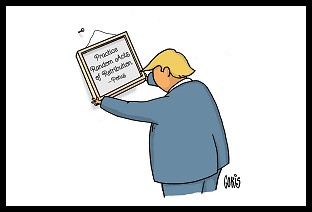 Sunday 'Random Acts of' Toons
Sunday 'Random Acts of' Toons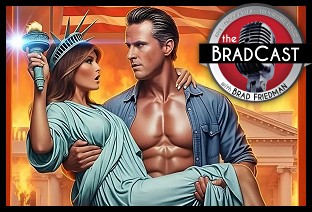 From CA's 'Nuclear Deterrence' Map to Newsom's Trolling to Trump's 'Fascist Theatre' and Beyond: 'BradCast' 8/21/25
From CA's 'Nuclear Deterrence' Map to Newsom's Trolling to Trump's 'Fascist Theatre' and Beyond: 'BradCast' 8/21/25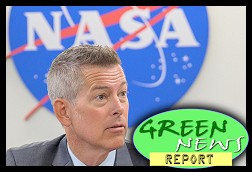 'Green News Report' 8/21/25
'Green News Report' 8/21/25
 On 'Americanism' and Trump's 'Stalinesque' Plot to Whitewash U.S. History: 'BradCast' 8/20/25
On 'Americanism' and Trump's 'Stalinesque' Plot to Whitewash U.S. History: 'BradCast' 8/20/25 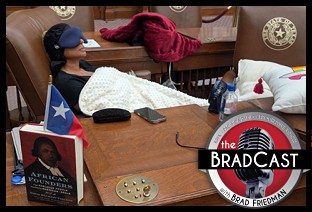 Texas GOP Imprisons Dem State Lawmaker in State House Chamber: 'BradCast' 8/19/25
Texas GOP Imprisons Dem State Lawmaker in State House Chamber: 'BradCast' 8/19/25 'Green News Report' 8/19/25
'Green News Report' 8/19/25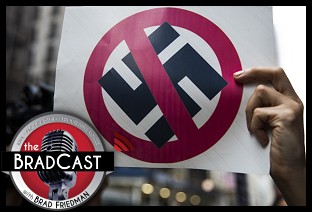 Trump, Nazis and
Trump, Nazis and 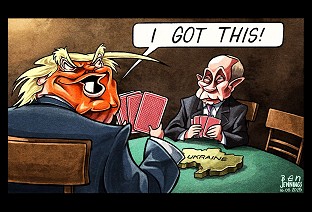 Sunday '
Sunday '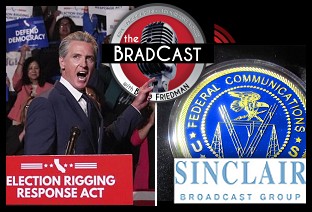 Newsom's 'Election Rigging Response Act'; FCC's License Renewal for Sock-Puppeting Sinclair: 'BradCast' 8/14/25
Newsom's 'Election Rigging Response Act'; FCC's License Renewal for Sock-Puppeting Sinclair: 'BradCast' 8/14/25 'Green News Report' 8/14/25
'Green News Report' 8/14/25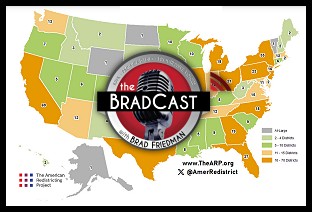 140 New House Reps?: Moving Beyond the Gerrymandering Wars: 'BradCast' 8/13/25
140 New House Reps?: Moving Beyond the Gerrymandering Wars: 'BradCast' 8/13/25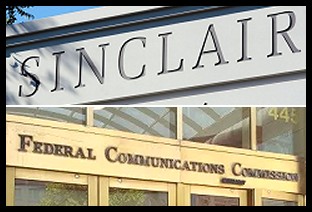 FCC Renews Sinclair TV Licenses Despite Complaint from Petitioner Who Died Waiting
FCC Renews Sinclair TV Licenses Despite Complaint from Petitioner Who Died Waiting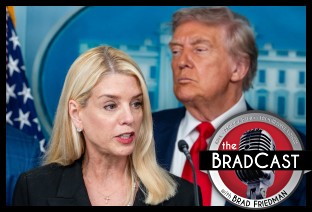 It's Not About the Rule of Law, It's About Authoritarian Control: 'BradCast' 8/12/25
It's Not About the Rule of Law, It's About Authoritarian Control: 'BradCast' 8/12/25 'Green News Report' 8/12/25
'Green News Report' 8/12/25 After Vaccine Cancels, CDC Shooting, Former Officials Want RFK Out: 'BradCast' 8/11/25
After Vaccine Cancels, CDC Shooting, Former Officials Want RFK Out: 'BradCast' 8/11/25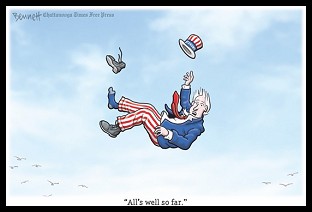 Sunday 'All's Well' Toons
Sunday 'All's Well' Toons 'Green News Report' 8/7/25
'Green News Report' 8/7/25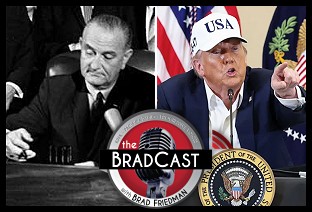 Trump Wars Against Greem Energy, Democracy on VRA's 60th: 'BradCast' 8/7
Trump Wars Against Greem Energy, Democracy on VRA's 60th: 'BradCast' 8/7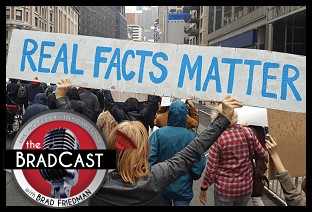 Media Conglomerates Continue Trump Capitulation: 'BradCast' 8/6/25
Media Conglomerates Continue Trump Capitulation: 'BradCast' 8/6/25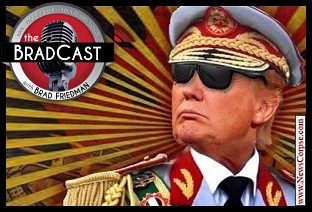 Banana Republican: Trump Shoots the Labor Statistics Messenger: 'BradCast' 8/5/25
Banana Republican: Trump Shoots the Labor Statistics Messenger: 'BradCast' 8/5/25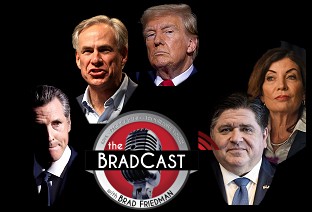 All's Fair in Love, War and, Apparently, Part-isan Gerrymandering: 'BradCast' 8/4/25
All's Fair in Love, War and, Apparently, Part-isan Gerrymandering: 'BradCast' 8/4/25 The Art of the Corrupt, Phony, Unlawful, Pretend Trade Deal: 'BradCast' 7/31/25
The Art of the Corrupt, Phony, Unlawful, Pretend Trade Deal: 'BradCast' 7/31/25 Battle Begins Against Trump EPA Climate Regulations 'Kill Shot': 'BradCast' 7/30/25
Battle Begins Against Trump EPA Climate Regulations 'Kill Shot': 'BradCast' 7/30/25 A Pu Pu Platter of Trump Corruption: 'BradCast' 7/29/25
A Pu Pu Platter of Trump Corruption: 'BradCast' 7/29/25 'Catastrophic' GOP Cuts to Medicaid, Medicare, ACA: 'BradCast' 7/28/25
'Catastrophic' GOP Cuts to Medicaid, Medicare, ACA: 'BradCast' 7/28/25
 VA GOP VOTER REG FRAUDSTER OFF HOOK
VA GOP VOTER REG FRAUDSTER OFF HOOK Criminal GOP Voter Registration Fraud Probe Expanding in VA
Criminal GOP Voter Registration Fraud Probe Expanding in VA DOJ PROBE SOUGHT AFTER VA ARREST
DOJ PROBE SOUGHT AFTER VA ARREST Arrest in VA: GOP Voter Reg Scandal Widens
Arrest in VA: GOP Voter Reg Scandal Widens ALL TOGETHER: ROVE, SPROUL, KOCHS, RNC
ALL TOGETHER: ROVE, SPROUL, KOCHS, RNC LATimes: RNC's 'Fired' Sproul Working for Repubs in 'as Many as 30 States'
LATimes: RNC's 'Fired' Sproul Working for Repubs in 'as Many as 30 States' 'Fired' Sproul Group 'Cloned', Still Working for Republicans in At Least 10 States
'Fired' Sproul Group 'Cloned', Still Working for Republicans in At Least 10 States FINALLY: FOX ON GOP REG FRAUD SCANDAL
FINALLY: FOX ON GOP REG FRAUD SCANDAL COLORADO FOLLOWS FLORIDA WITH GOP CRIMINAL INVESTIGATION
COLORADO FOLLOWS FLORIDA WITH GOP CRIMINAL INVESTIGATION CRIMINAL PROBE LAUNCHED INTO GOP VOTER REGISTRATION FRAUD SCANDAL IN FL
CRIMINAL PROBE LAUNCHED INTO GOP VOTER REGISTRATION FRAUD SCANDAL IN FL Brad Breaks PA Photo ID & GOP Registration Fraud Scandal News on Hartmann TV
Brad Breaks PA Photo ID & GOP Registration Fraud Scandal News on Hartmann TV  CAUGHT ON TAPE: COORDINATED NATIONWIDE GOP VOTER REG SCAM
CAUGHT ON TAPE: COORDINATED NATIONWIDE GOP VOTER REG SCAM CRIMINAL ELECTION FRAUD COMPLAINT FILED AGAINST GOP 'FRAUD' FIRM
CRIMINAL ELECTION FRAUD COMPLAINT FILED AGAINST GOP 'FRAUD' FIRM RICK SCOTT GETS ROLLED IN GOP REGISTRATION FRAUD SCANDAL
RICK SCOTT GETS ROLLED IN GOP REGISTRATION FRAUD SCANDAL VIDEO: Brad Breaks GOP Reg Fraud Scandal on Hartmann TV
VIDEO: Brad Breaks GOP Reg Fraud Scandal on Hartmann TV RNC FIRES NATIONAL VOTER REGISTRATION FIRM FOR FRAUD
RNC FIRES NATIONAL VOTER REGISTRATION FIRM FOR FRAUD EXCLUSIVE: Intvw w/ FL Official Who First Discovered GOP Reg Fraud
EXCLUSIVE: Intvw w/ FL Official Who First Discovered GOP Reg Fraud GOP REGISTRATION FRAUD FOUND IN FL
GOP REGISTRATION FRAUD FOUND IN FL

































